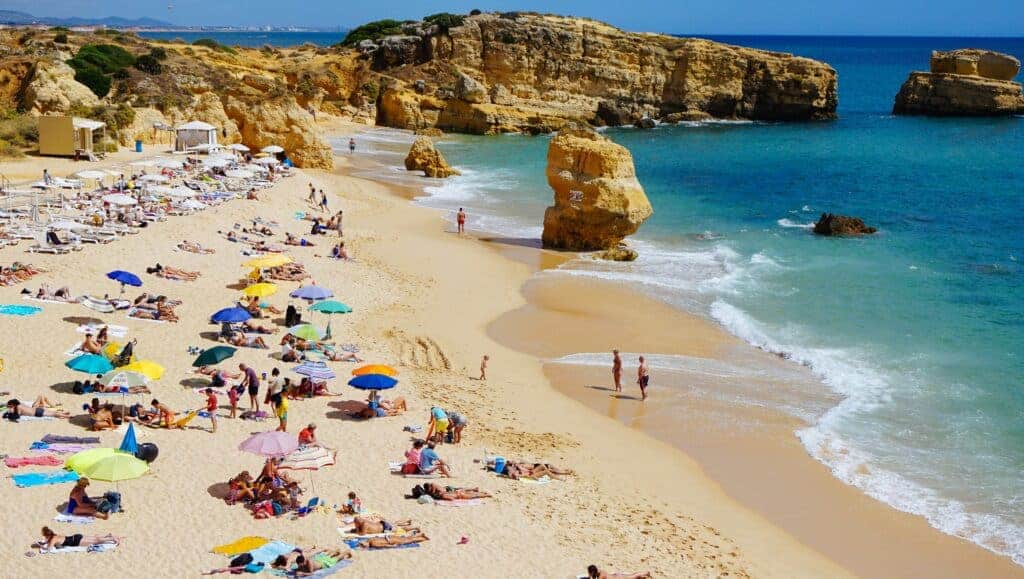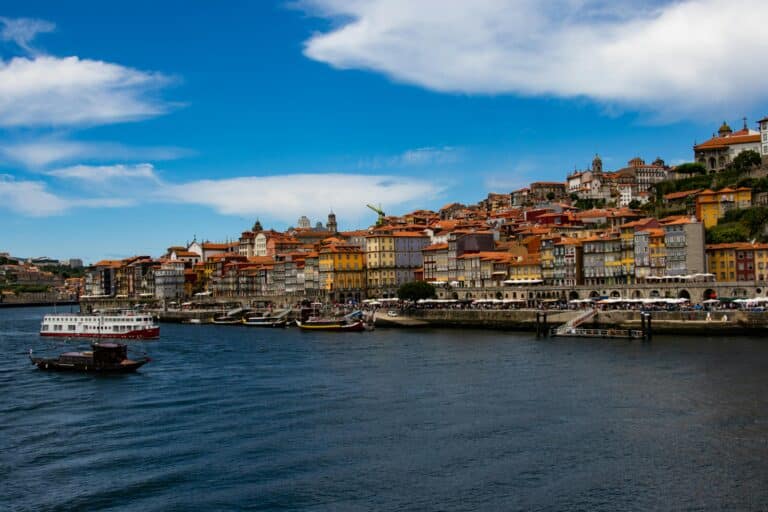Planning a move to Portugal? You’re not alone. Attracted by the country’s world-class healthcare, rich culture, and affordable cost of living, the American expat community in Portugal has more than tripled since 2019.
At Remitly, we understand that choosing a place to live in a new country can be daunting. This guide takes a look at some of the most popular destinations for American expats in Portugal, from bustling tech hubs to laid-back coastal towns.
What are the best cities for expats in Portugal?
In recent years, nearly 15,000 Americans have moved to Portugal and made their new home in vibrant coastal communities and historic inland spots.
We’ve evaluated each Portuguese city based on housing costs, job markets, healthcare facilities, expat communities, and quality of life to help you make an informed choice.
Lisbon: cosmopolitan, historic, and vibrant
Portugal’s capital city combines historic charm with modern infrastructure, making it the country’s most popular destination for American expats. In addition to its vibrant culture and friendly locals, Lisbon offers a variety of neighborhoods that cater to different lifestyles, from historic Alfama to the contemporary hub of Bairro Alto. For those considering life in Europe, it’s often compared to the top cities in Spain for expats, such as Barcelona and Madrid, which also boast unique attractions and amenities. With affordable living and stunning landscapes, it’s no wonder Lisbon is a favored choice for newcomers looking to experience life abroad.
Pros
- Large and diverse expat community, making it easy to get to know other Americans and English speakers.
- Thriving startup and digital nomad scene, providing job opportunities for skilled professionals.
- Excellent international connectivity, with the country’s largest international airport practically in the city.
Cons
- More expensive than any other Portuguese city, particularly in terms of housing.
- Very crowded all year round, especially in the most touristy areas.
Outside the city center, Americans often choose to settle in neighboring Cascais, Sintra, or Setúbal, all of which offer access to Lisbon’s opportunities while affording different lifestyle advantages.
Porto: proud, soulful, and artistic
Also known as “Invicta” (the Undefeated), the largest city in Northern Portugal offers a more authentic experience that appeals to many U.S. expats.
Pros
- Rich history and cultural heritage, including a UNESCO-protected historic center, outstanding local cuisine, and world-famous port wine culture.
- Growing creative industry with numerous art galleries, museums, festivals, and events
- Strong sense of community in a more relaxed, traditional atmosphere.
Cons
- More rainfall and cooler temperatures than southern Portugal.
- Gentrification has pushed up rent prices, making it difficult for both locals and expats to afford housing, even across the Douro River in Vila Nova de Gaia.
The family-friendly Foz district offers beautiful Atlantic beaches and proximity to top international schools, while the nearby Douro Valley boasts world-class wineries and stunning landscapes.
Faro: sunny, relaxed, and international
With more than 300 days of sunshine a year and a significantly lower cost of living than Lisbon and Porto, Faro attracts Americans seeking the right balance of urban convenience and beach lifestyle.
Pros
- Large English-speaking population and established international community.
- Warm climate that allows for a year-round outdoor lifestyle, including easy access to beautiful beaches and world-class golf courses.
- One of Portugal’s safest major cities, with a laid-back Mediterranean vibe that appeals to retirees and families.
Cons
- Seasonal influx of tourists in the summer can be extremely disruptive.
- Job market primarily focused on tourism and hospitality.
From Faro, American expats can travel the entire Algarve region—from the Spanish border in the east to Sagres in the west—exploring vibrant resort towns like Portimão, Lagos, and Praia da Luz.
Coimbra: academic, traditional, and accessible
Home to the University of Coimbra, one of the oldest continuously operating universities in the world, the city combines academic life with exceptional healthcare and a strategic location in Central Portugal.
Pros
- Vibrant student atmosphere, creating a unique blend of traditional city life and international flair.
- World-class healthcare facilities, including the university’s renowned clinical research and medical center.
- Central position at the heart of Portugal, with both Porto and Lisbon less than two hours away.
Cons
- Pace of life is dictated by the academic calendar, with some areas feeling deserted during holidays.
- Housing market is heavily geared towards students, making long-term rentals difficult to find.
Coimbra boasts a mild climate and both the beaches of the Silver Coast and the mountains of Serra da Estrela at a stone’s throw, while its historic center offers centuries-old cafés, bookstores, and traditions.
Funchal: subtropical, scenic, and sophisticated
Madeira’s capital offers a year-round spring climate, cutting-edge digital infrastructure, and dramatic ocean views, making it increasingly popular with American digital nomads and retirees.
Pros
- Perfect climate with temperatures rarely dropping below 65°F (18°C) or rising above 80°F (27°C).
- Special economic zone offers significant business opportunities and tax benefits for certain professions
- Blend of European sophistication and tropical island life, with centuries-old gardens, traditional markets, and waterfront dining.
Cons
- Island location means higher prices for imported goods compared to the mainland.
- Cristiano Ronaldo International Airport is not for the faint-hearted.
Madeira’s natural beauty offers everything from stunning beaches to volcanic pools—a treasure island for expats looking for adventure.
Braga: innovative, spiritual, and energetic
The second-largest city in Northern Portugal blends ancient religious heritage with cutting-edge technological education, all while ranking as the country’s top city for English proficiency.
Pros
- One of Europe’s top startup hubs, with a rapidly growing entrepreneurial ecosystem.
- Unique religious heritage, with famous Holy Week celebrations attracting thousands of tourists from Spain and beyond.
- Strong international student community, creating a young, multilingual atmosphere.
Cons
- Limited public transportation, with 70% of the population needing to drive daily.
- Religious diversity is respected, but the strong religious presence may not appeal to all expats.
Braga’s technology park has become a magnet for both established companies and innovative start-ups, while the University of Minho’s engineering programs attract students and professionals from around the world.
Évora: medieval, peaceful, and authentic
Perhaps the smallest big city in Portugal, this UNESCO World Heritage Site offers a genuine slice of Portuguese life in the heart of Alentejo.
Pros
- One of the best-preserved historic city centers in Europe, completely enclosed by a medieval wall.
- Access to what many consider the country’s premier wine region, with miles of vineyards and olive groves.
- Unhurried atmosphere, perfect for those seeking total immersion in Portuguese culture.
Cons
- Intense summer heat with temperatures regularly exceeding 95°F (35°C).
- Smaller expat community than other major cities, despite the low cost of living.
Évora offers an authentic Portuguese experience, where Roman temples sit next to Gothic cathedrals and traditional bakeries share streets with wine bars.
Tips for Americans moving to Portugal
Ready to make the move? These are some of the things to keep in mind as you prepare:
- Visa requirements: If you plan to stay in Portugal for more than 90 days, you’ll need a visa. Popular options include the D7 visa for retirees and others with passive income, the D8 Digital Nomad visa for remote workers, and the D2 for entrepreneurs. There’s also a Golden Visa route for investors.
- Healthcare: Portugal has an excellent public healthcare system that is available to all legal residents—you just need to register at your local health center. However, many expats choose to take out private insurance (typically 40-100 EUR per month) to have shorter waiting times and greater access to English-speaking doctors.
- Language: English proficiency is generally very high in Portugal, but learning some Portuguese will make everyday life much easier. Local language schools offer intensive courses, and language-exchange meetings in cafés can provide opportunities for practice.
- Daily schedule: Adjust to the Portuguese schedule—many businesses close in the middle of the day for lunch, usually between 1:00 and 2:30 p.m. Dinner is also later than you may be used to, often around 9 p.m. Nightlife doesn’t really get started until 11 p.m. or midnight.
- Banking and finances: Open a Portuguese bank account and get a Portuguese credit card to handle daily expenses and housing payments. You will need a Portuguese tax number (NIF), which you can obtain from your local tax office (Finanças).
Download the Remitly app to manage your international finances with confidence. Our exchange rates and reliable transfers help you maintain strong financial connections while building your new life abroad.

FAQs about living in Portugal
Nearly 15,000 Americans now call Portugal home. About 40% live in the Lisbon metropolitan area, including popular spots like Cascais and Sintra. The Algarve region and Porto are the next most popular destinations, each hosting around 20% of the American community.
The best retirement destination depends on the lifestyle you’re seeking in your golden years.
High quality of life and luxury real estate developments in Melides are drawing American celebrities like George Clooney and Sharon Stone to this emerging coastal paradise.
On the Silver Coast, the colorful canals of Aveiro—known as the Venice of Portugal—and the gentle waters of São Martinho do Porto provide more affordable living.
In the Algarve, the more established expat communities of Vale do Lobo and Quinta do Lago offer exclusive golf resorts and retirement villages. The eastern towns of Tavira and Castro Marim are quieter alternatives.
You can manage daily life in major cities and tourist areas with English alone. However, outside urban centers, even simple tasks like grocery shopping may require basic Portuguese. Check out our guide to the best language learning apps to help you get started.
Like most Southern European countries, Portuguese work culture emphasizes work-life balance over rigid schedules. Meetings often begin with casual conversation, and lunch breaks can last up to two hours. Salaries are typically lower than comparable U.S. positions, but the work week is normally 30-40 hours.

